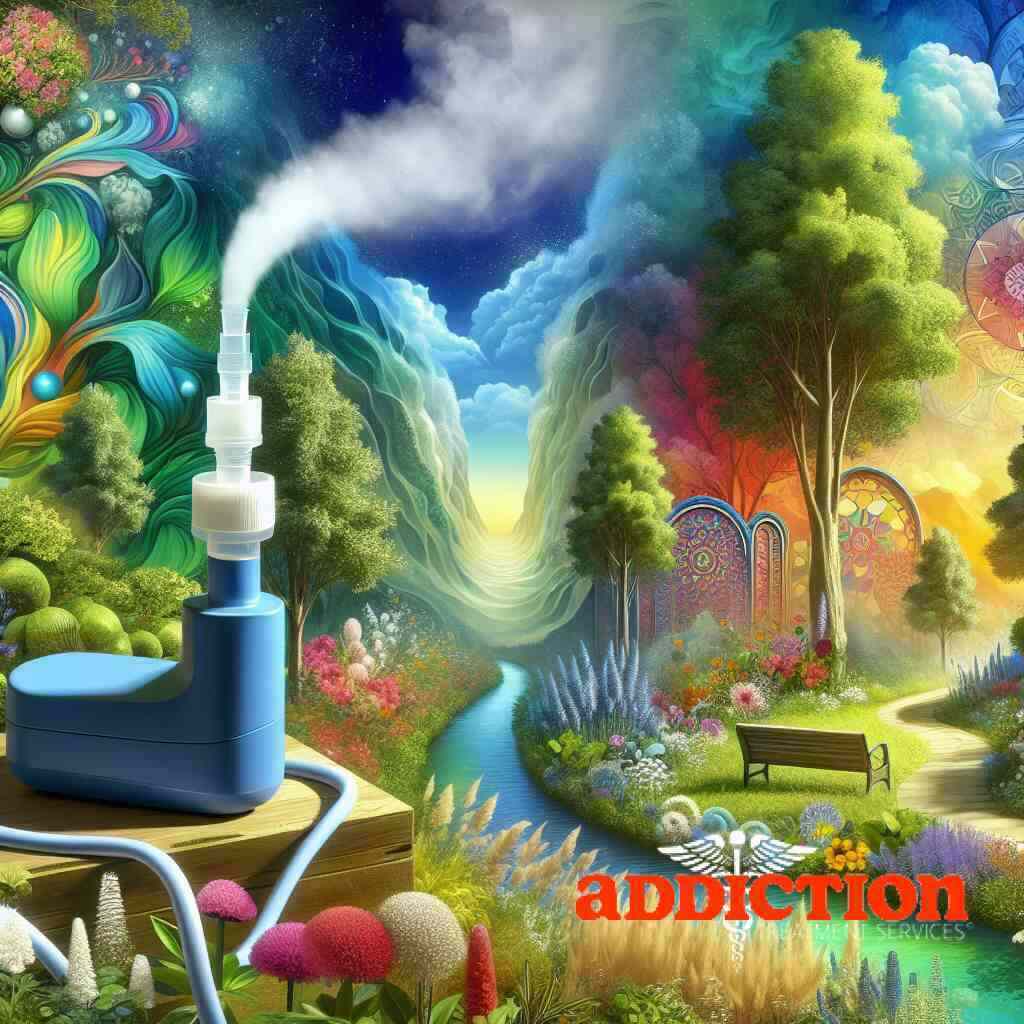 Posted On: 10/18/2024
Posted On: 10/18/2024Introduction: The Breath of Life
The Essential Nature of Breathing
Breathing is the fundamental essence of life, an involuntary act that sustains every cell in our bodies. Each breath we take delivers oxygen to our bloodstream and expels carbon dioxide, facilitating essential metabolic processes. The rhythmic exchange of gases plays a crucial role in maintaining homeostasis, supporting cognitive function, and providing the energy needed for daily activities. For individuals battling respiratory issues and substance use disorders, understanding breathing’s role becomes even more paramount. Breathing therapy is a vital intervention for those in need of enhanced respiratory function, aiming to restore the balance disrupted by addiction or health conditions.
Understanding Breathing Treatments
Breathing treatments encompass various therapies aimed at improving and maintaining optimal respiratory health. These interventions include techniques such as nebulizer treatment, which delivers medication directly into the lungs, and pulmonary rehabilitation for long-term lung capacity enhancement. For those struggling with asthma or chronic obstructive pulmonary disease (COPD), effective management often relies on inhalation therapy. By understanding the different modalities available, individuals can find tailored solutions to their unique respiratory challenges, often as part of a comprehensive breathing therapy approach.
The Intersection of Lung Health and Addiction Recovery
The impact of substance misuse on respiratory health is substantial, often exacerbating existing lung conditions or triggering new ones. Recovering from addiction while managing lung health requires an integrated approach. This involves addressing the physical and psychological aspects of substance use disorders alongside respiratory care. Combining therapies like bronchodilator treatments and holistic breathing exercises makes it possible to rebuild both physical wellness and a state of mental equilibrium. Understanding the complex link between addiction recovery and lung health offers a pathway to comprehensive healing and sustained recovery. In fact, personalized plans that incorporate such dual-focus treatments are key to successful outcomes. By understanding this connection, individuals can better navigate their journey to respiratory wellness, ensuring long-term health and recovery success. For further insight, exploring addiction recovery and lung health can provide supportive resources and guidance.
The Science Behind Breathing Treatments
Exploring Respiratory Therapies
Respiratory therapies play a vital role in addressing various lung conditions that impair breathing. Healthcare providers design individualized plans to improve respiratory function, encompassing treatments like pulmonary therapy and breathing exercises. For patients with chronic disorders like asthma and COPD, therapies emphasize airway clearance and enhance lung ventilation efficiency. Advanced techniques such as nebulizer treatment can administer life-saving medication directly to the airways, providing immediate relief. By exploring these vital therapies, individuals can gain a deeper understanding of the methods that support respiratory health and the technological advancements that continue to transform pulmonary care.
Breathing treatments like nebulizer therapy are crucial in managing conditions that lead to respiratory distress. Essential Tips for Integrative Addiction Care in MI They cater to different needs by integrating advanced medical technology and age-old breathing techniques. Such therapies not only help address acute needs but also contribute positively to long-term respiratory wellness outcomes. With increasing innovation, more personalized and effective treatment modalities become available, accommodating diverse patient profiles and enhancing the quality of life.
From Airway Clearance to Oxygen Therapy
Airway clearance therapies are central to managing and alleviating symptoms of lung conditions by removing excess mucus and reducing airway obstruction. Techniques such as chest physiotherapy, high-frequency chest wall oscillation, and mechanical insufflation-insufflation are key strategies. These methods facilitate better airflow, supporting optimal breathing patterns. Subsequently, effective airway clearance seamlessly pairs with oxygen therapy, which ensures the lungs receive adequate oxygen, especially in cases where respiratory function is compromised.
Oxygen therapy is indispensable for patients with chronic respiratory diseases. It delivers supplemental oxygen to maintain adequate blood oxygen levels. The therapy alleviates symptoms like breathlessness and fatigue, significantly improving daily quality of life. Commonly administered through nasal cannulas or masks, oxygen therapy is adaptable, fitting diverse lifestyle needs. As technology advances, portable devices now enable patients to enjoy greater mobility and independence.
The Role of Medication Inhalation in Pulmonary Care
Inhalation therapy remains an integral component of comprehensive pulmonary care, facilitating the direct delivery of medications into the lungs. Can You Be Addicted to a Person? This approach ensures rapid onset of action, optimizing drug efficacy while minimizing systemic side effects. Treatments include bronchodilators, anti-inflammatories, and antibiotics, each tailored to address specific respiratory conditions. Effective inhalation techniques and devices, such as inhalers and nebulizers, contribute significantly to improved patient outcomes.
Administrators of inhalation therapy, such as healthcare professionals, often emphasize the importance of proper medication inhalation processes, guiding patients for better compliance and benefits. Whether treating asthma, COPD, or other respiratory disorders, these treatments empower patients to manage their conditions actively. This pivotal role in pulmonary care underscores the importance of patient education and regular follow-up to ensure therapy efficacy and adherence.
By fostering a deeper understanding of these therapies, individuals can equip themselves with knowledge essential for managing respiratory challenges effectively, aligning with holistic health approaches, and enhancing overall wellness.
Varieties of Breathing Treatments: Understanding the Options
Pulmonary Rehabilitation and Nebulizer Treatments
Pulmonary rehabilitation provides a tailored program designed to strengthen lung capacity and improve respiratory efficiency. Ultimate Guide to Outpatient Treatment Near Me Often consisting of exercise training, nutritional advice, and education on lung health, pulmonary rehabilitation empowers patients to regain control over their breathing. For residents in California, access to premier pulmonary rehabilitation services offers insight into individualized care plans. Alongside, nebulizer treatments offer a direct method of administering medication. Utilizing a nebulizer machine, these treatments transform liquid medicine into a mist, optimizing delivery to the lungs and offering rapid relief. Especially beneficial for individuals with chronic conditions like asthma, nebulizer treatments have become increasingly accessible and varied, offering flexibility and effectiveness in breathing treatment regimens.
Navigating Inhaler Use for Asthma Management
Effective asthma management often hinges on the strategic use of inhalers, which deliver medication directly into the airways to open them and alleviate constriction. Best Practices for Outpatient Care in Texas Understanding the nuances of inhaler use, such as timing and technique, is crucial for optimal therapeutic outcomes. The field of asthma management continues to evolve with technological advances, providing more efficient inhalation devices and medication combinations. As per guidelines from leading health experts, appropriate inhaler use can drastically reduce asthma symptoms and prevent exacerbations. Patients must regularly consult healthcare providers to ensure their inhalation techniques are aligned with their specific respiratory needs, thereby facilitating a more balanced, symptom-free life.
Bronchodilator Therapy: Breathing Easier and Better
Bronchodilator therapy serves as a cornerstone in managing conditions like COPD and severe asthma, providing swift relief through airway dilation. These medications, administered via inhalers or nebulizers, function by relaxing the muscles surrounding the airways, making breathing substantially easier. The benefits of bronchodilator therapy include not only immediate relief of breathing distress but also a decrease in the frequency and severity of respiratory complications. For individuals facing persistent respiratory issues, routine bronchodilator therapy has become an integral part of the management strategy, offering a pathway to enhanced respiratory function and improved quality of life. By fostering better adherence to prescription guidelines, this treatment enhances patient empowerment, equipping them with tools to handle their respiratory health effectively.
The Connection Between Lung Health and Wellness
The Impact of Substance Use Disorders on Respiratory Health
Substance use disorders significantly deteriorate respiratory health, further complicating the struggle with addiction. Many substances, including tobacco, opioids, and illicit drugs, directly harm lung tissue and lead to conditions like chronic obstructive pulmonary disease and lung infections. The impact of addiction on lung function is profound, leading to reduced lung capacity and increased risk of respiratory diseases. Individuals with substance use disorders often face difficulty breathing, which can exacerbate withdrawal symptoms and hinder recovery progress. This intertwines the challenges of addiction recovery with managing deteriorating lung health, highlighting the necessity of comprehensive care strategies that address both addiction and respiratory wellness. Understanding these complexities is vital for anyone seeking recovery from substance misuse.
Breathing Treatments as a Complement to Addiction Recovery
Incorporating breathing treatments into addiction recovery plans provides a holistic approach to healing, fostering overall well-being. Breathing treatments, such as nebulizer therapy and pulmonary rehabilitation, aid in restoring lung function compromised by substance abuse. These interventions serve as essential components of recovery, alleviating respiratory distress and improving lung capacity, enabling individuals to engage more fully in recovery activities. By integrating breathing treatments, addiction treatment services can offer more comprehensive care that addresses both the physical and psychological dimensions of recovery. This dual focus enhances the quality of life for individuals in recovery, making breathing treatments a powerful complement to traditional addiction treatment modalities.
Incorporating Breathing Exercises in Holistic Health Plans
Holistic health plans emphasize overall well-being, incorporating various breathing exercises to support mental and physical health. Holistic exercises such as yoga, meditation, and controlled breathing techniques are instrumental in enhancing lung function and reducing stress levels, pivotal in addiction recovery. These practices promote respiratory health by increasing lung capacity, facilitating relaxation, and improving mind-body connection. In holistic breathing exercises, individuals find effective tools for managing cravings and reducing withdrawal-induced anxiety. By weaving breathing exercises into recovery plans, treatment facilities can enhance resilience against relapse, supporting long-term recovery paths. Encouraging participants to engage in these exercises actively equips them with lifelong skills for maintaining respiratory and overall health.
Innovations in Breathing Treatments: A Look Forward
Cutting-Edge Respiratory Care Techniques
Advancements in respiratory care continually redefine the landscape of treatment options available to those suffering from lung conditions. Innovative solutions such as smart inhalers, enhanced bronchial thermoplasty, and improved medication delivery systems have emerged as pivotal elements in modern care. Technologies like smart inhalers not only track usage but also remind patients to take their medication, thereby ensuring adherence and improving outcomes. Enhanced bronchial thermoplasty provides a non-pharmacological option aimed at severe asthma, potentially reducing the frequency of asthma attacks through controlled heat treatment of the airway walls. These cutting-edge techniques exemplify the strides being made in improving patient empowerment and autonomy in managing their respiratory disorders.
Moreover, the integration of telehealth into respiratory care facilitates remote monitoring and consultation, breaking geographical barriers to access. This approach supports continuous disease management and immediate intervention in case of exacerbations, highlighting the importance of digital advancements in breathing treatments. These innovations represent a beacon of hope for individuals striving to manage their lung health more effectively.
Enhancing Lung Capacity and Function
Increasing lung capacity and enhancing pulmonary function stand at the forefront of respiratory treatment advancements. Techniques such as inspiratory muscle training and high-intensity interval training have demonstrated significant benefits in improving respiratory stamina. Inspiratory muscle training targets the muscles used for inhalation, strengthening them to promote more efficient breathing patterns. High-intensity interval training has gained prominence for its ability to boost cardiovascular and pulmonary health, offering a potent, time-efficient way to enhance lung function and reduce symptoms of airway obstruction.
Beyond exercise, pharmacological interventions play a critical role in improving pulmonary function. New medications designed to reduce inflammation and mucus production provide additional pathways for enhancing lung efficiency. As research continues to evolve, understanding and implementing personalized care strategies remain essential for effectively managing conditions like COPD and asthma. These advancements, coupled with traditional respiratory therapies, allow for a harmonious approach to care that improves the quality of life and lung function.
The Future of Respiratory Disorder Treatments
Looking ahead, the future of respiratory disorder treatments is poised for transformation, driven by scientific innovation and interdisciplinary research. Breakthroughs in biotechnologies, such as gene therapy, hold the potential to address the root causes of genetic respiratory diseases by directly altering defective genes. Similarly, regenerative medicine offers promising avenues for repairing lung tissue damage incurred by chronic conditions or environmental factors.
In addition to these groundbreaking therapies, novel drugs, and diagnostic tools are under development to further fine-tune treatment plans and improve patient-specific outcomes. The integration of artificial intelligence and machine learning in data analysis promises enhanced predictive modeling of disease progressions, aiding in preemptive care strategies. Such innovations not only signal a shift towards more tailored and preventative care models but also stand as a testament to the ongoing commitment to advancing respiratory health.
These emerging therapies offer insights into the trajectory of care for those navigating the complexities of respiratory disorder management. Exploring the future of pulmonary health is pivotal in crafting sustainable health journeys for individuals worldwide. Indeed, as these innovations unfold, they herald a transformative era in pulmonary care, where maintaining respiratory wellness becomes an achievable reality for many.
Conclusion: Embrace the Breath of Recovery
Integrating Respiratory Wellness in Recovery Routines
Incorporating respiratory wellness into recovery routines is essential for achieving comprehensive healing, especially for individuals recovering from substance use disorders. By integrating breathing treatments such as nebulizer therapy and pulmonary rehabilitation, patients can experience significant improvements in lung function. These improvements foster greater participation in recovery activities, contributing to sustainable recovery success. Embracing respiratory wellness also promotes resilience against relapse, equipping individuals with tools to manage stress and cravings effectively. Establishing routines that prioritize lung health can transform the recovery journey, empowering individuals to overcome challenges and achieve a balanced, healthy life.
Empowering Life with Better Breathing
Life changes dramatically when one has the tools to breathe easier, making empowerment through effective respiratory care a critical aspect of recovery. By utilizing therapies like bronchodilator treatments and controlled breathing exercises, individuals can enhance their overall quality of life. Better breathing leads to increased energy, improved mental clarity, and a stronger ability to engage in everyday activities. This empowerment extends beyond physical health, fostering emotional well-being and self-confidence. The Best Addiction Recovery Movies? For those overcoming addiction, effective breathing strategies can become a powerful ally in maintaining sobriety and pursuing personal growth. By embracing the power of improved respiration, individuals can unlock their potential for an enriched, healthier life free from the constraints of respiratory challenges.
Final Thoughts on the Journey to Respiratory Health
The journey to respiratory health is a multifaceted path that requires commitment, knowledge, and support. By understanding the vital role of breathing treatments and integrating them into daily routines, individuals can achieve significant strides in both physical health and addiction recovery. As science and technology continue to advance, opportunities for improved respiratory care become more accessible and effective. Individuals are encouraged to explore personalized treatment plans, adhere to prescribed therapies, and actively engage in holistic practices. By pursuing respiratory wellness, one can embark on a fulfilling journey toward a healthier, more empowered existence. For those seeking guidance, exploring options like overcoming addiction and breathing difficulties offers valuable insights and support for their recovery pathway.” }
Frequently Asked Questions
Question: How can breathing treatments help individuals recovering from substance use disorders?
Answer: Breathing treatments play a pivotal role in supporting those recovering from substance use disorders by enhancing lung capacity and respiratory function. Guide to Dual Diagnosis Programs in Michigan Substance misuse often impacts lung health, leading to complications such as chronic obstructive pulmonary disease. Through therapies like pulmonary rehabilitation and nebulizer treatment, individuals can restore lung function, alleviate respiratory distress, and improve overall wellness. By integrating these treatments into recovery routines, Addiction Treatment Services assists patients in overcoming respiratory challenges, fostering more holistic recovery success.
Question: What types of respiratory treatments do Addiction Treatment Services recommend for managing respiratory disorders?
Answer: Addiction Treatment Services recommends various respiratory therapy options tailored to individual needs to manage conditions like asthma and COPD. These include inhalation therapy, bronchodilator therapy, and oxygen therapy to support lung health and reduce symptoms such as shortness of breath. Nebulizer treatment allows for direct, efficient medication delivery into the lungs, providing quick relief. By offering a comprehensive directory of treatment centers, Addiction Treatment Services ensures you have access to these essential therapies, leading to improved respiratory wellness.
Question: How does the blog ‘What Is A Breathing Treatment?’ inform those seeking addiction recovery services and respiratory care?
Answer: The blog ‘What Is A Breathing Treatment?’ serves as a vital resource for individuals navigating the intersection of respiratory health and addiction recovery. It provides extensive insights into how therapies like breathing exercises and nebulizer treatments aid in lung health improvement while promoting overall well-being. What Does Mental Health Services Mean for Recovery? Addiction Treatment Services harnesses this knowledge to offer comprehensive addiction recovery support, addressing both mental and respiratory health in its treatment plans.
Question: Can breathing treatments be integrated as part of a holistic health plan for addiction recovery?
Answer: Absolutely; breathing treatments can be seamlessly integrated into holistic health plans to support recovery from substance abuse. By incorporating breathing exercises and pulmonary rehabilitation, physical and mental well-being can be significantly enhanced. These practices improve lung capacity, reduce stress, and offer a natural method for managing withdrawal symptoms. Addiction Treatment Services recognizes the importance of holistic approaches and emphasizes the inclusion of respiratory care to strengthen recovery pathways, aligning with its comprehensive approach to addiction treatment.
Question: What innovations in breathing treatments are highlighted by Addiction Treatment Services to aid respiratory disorder treatment?
Answer: Addiction Treatment Services stays at the forefront of innovation in respiratory disorder treatment, highlighting cutting-edge techniques like smart inhalers, advanced nebulizer therapies, and telehealth for remote care. Exploring the Rise of E-Therapy in Addiction Care These innovations enhance adherence, improve patient outcomes, and increase accessibility to necessary care. By tapping into these advances, Addiction Treatment Services ensures you receive state-of-the-art respiratory care as part of your recovery journey, demonstrating its commitment to enhancing patient empowerment through effective treatment options.




